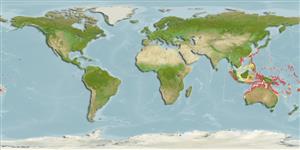Common names from other countries
>
Anguilliformes (Eels and morays) >
Muraenidae (Moray eels) > Uropterygiinae
Etymology: Uropterygius: Greek, oura = tail + Greek pterygion = little wing. Fin (Ref. 45335); nagoensis: Named after Nago, its type locality..
Environment: milieu / climate zone / depth range / distribution range
বাস্তুসংস্থান
সামুদ্রিক তলদেশ বিহারী; গভীরতার পরিসীমা 3 - 30 m (Ref. 90102). Subtropical; 31°N - 36°S, 94°E - 172°W
Indo-Pacific: only from the Red Sea to the Society and Solomon Is., north to Japan, south to Australia.
আকৃতি / ওজন / Age
Maturity: Lm ? range ? - ? cm
Max length : 80.0 cm TL পুরুষ/ লিঙ্গ অনিধর্ারিত ; (Ref. 121606)
কশেরুকা : 136 - 138.
Inhabits caves and crevices of coral reef in about 10-30 m (Ref 90102).
Life cycle and mating behavior
Maturities | প্রজনন | Spawnings | Egg(s) | Fecundities | শুককীট
Masuda, H., K. Amaoka, C. Araga, T. Uyeno and T. Yoshino, 1984. The fishes of the Japanese Archipelago. Vol. 1. Tokai University Press, Tokyo, Japan. 437 p. (text). (Ref. 559)
IUCN Red List Status (Ref. 130435)
CITES (Ref. 128078)
Not Evaluated
Threat to humans
Harmless
Human uses
হাতিয়ার
Special reports
Download XML
ইন্টারনেট সুত্র
Estimates based on models
Preferred temperature (Ref.
115969): 24.6 - 29.3, mean 28.4 (based on 1733 cells).
Phylogenetic diversity index (Ref.
82804): PD
50 = 0.5000 [Uniqueness, from 0.5 = low to 2.0 = high].
Bayesian length-weight: a=0.00069 (0.00033 - 0.00144), b=3.12 (2.93 - 3.31), in cm Total Length, based on LWR estimates for this (Sub)family-body shape (Ref.
93245).
ট্রফিক পর্যায়ে (Ref.
69278): 3.6 ±0.6 se; based on size and trophs of closest relatives
স্থিতিস্থাপক (Ref.
120179): নিম্ন/ , সর্বনিম্ন প্রজন দ্বিগুনের সময় ৪.৪-১৪ বৎসর (Preliminary K or Fecundity.).
Fishing Vulnerability (Ref.
59153): Moderate to high vulnerability (52 of 100).
